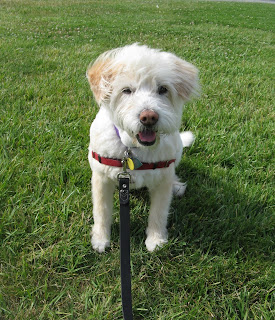 Abbey and her previous person were inseparable and did virtually everything
together. They shared a very deep bond filled with mutual love and respect for
six long years after Abbey was adopted from the Santa Cruz SPCA. Tragically,
Abbey's other half was hit by a car and killed while walking in a crosswalk. Not
only did this horrific event leave Abbey without her person, it also left her
without a home after attempts to place her by friends and family members failed.
Abbey and her previous person were inseparable and did virtually everything
together. They shared a very deep bond filled with mutual love and respect for
six long years after Abbey was adopted from the Santa Cruz SPCA. Tragically,
Abbey's other half was hit by a car and killed while walking in a crosswalk. Not
only did this horrific event leave Abbey without her person, it also left her
without a home after attempts to place her by friends and family members failed.
This beautiful 12-year-old Wheaton terrier mix is
settling in at the Santa Cruz SPCA, and although she is very obviously grieving,
her sweet and calm nature is winning hearts already. You would never guess her
age; Abbey is extremely able-bodied and loves to fetch balls and take long
walks. She's been through obedience classes and knows basic commands like sit,
stay, come and down and walks wonderfully on leash. In the home she's mellow,
quiet and completely house-trained. She enjoys lying at your feet, by your side
or following you from room to room. This is a seasoned house dog who's smart to
boot!
The perfect home for this sweetheart would be with a kind and gentle person or
an adult family with no small children. She prefers a gentle approach when first
greeting, as fast movements by strangers intimidate her. After just a couple
seconds her tail begins wagging and she'll give a few kisses for good measure. She seems to tolerate other dogs but doesn't enjoy puppy energy or
engaging in play. That being said, we could see her doing OK in a home with
another older dog or as an only dog.
Abbey has a lot of life and love to give a special person. She's lost a soulmate, but that doesn't mean there isn't another perfect someone out there for her. If you think you may be the one to pick up her pieces, please come meet her!
The SPCA's adoption package for dogs and cats includes spay/neuter, vaccinations, micro-chipping, an ID tag, collar, a free vet exam, one month's free health insurance and other animal care materials.
Consider donating to the nonprofit Santa Cruz SPCA, which receives no government funding. The Second Chance Fund also helps pay for emergency surgical procedures.






.jpg)
.jpg)

